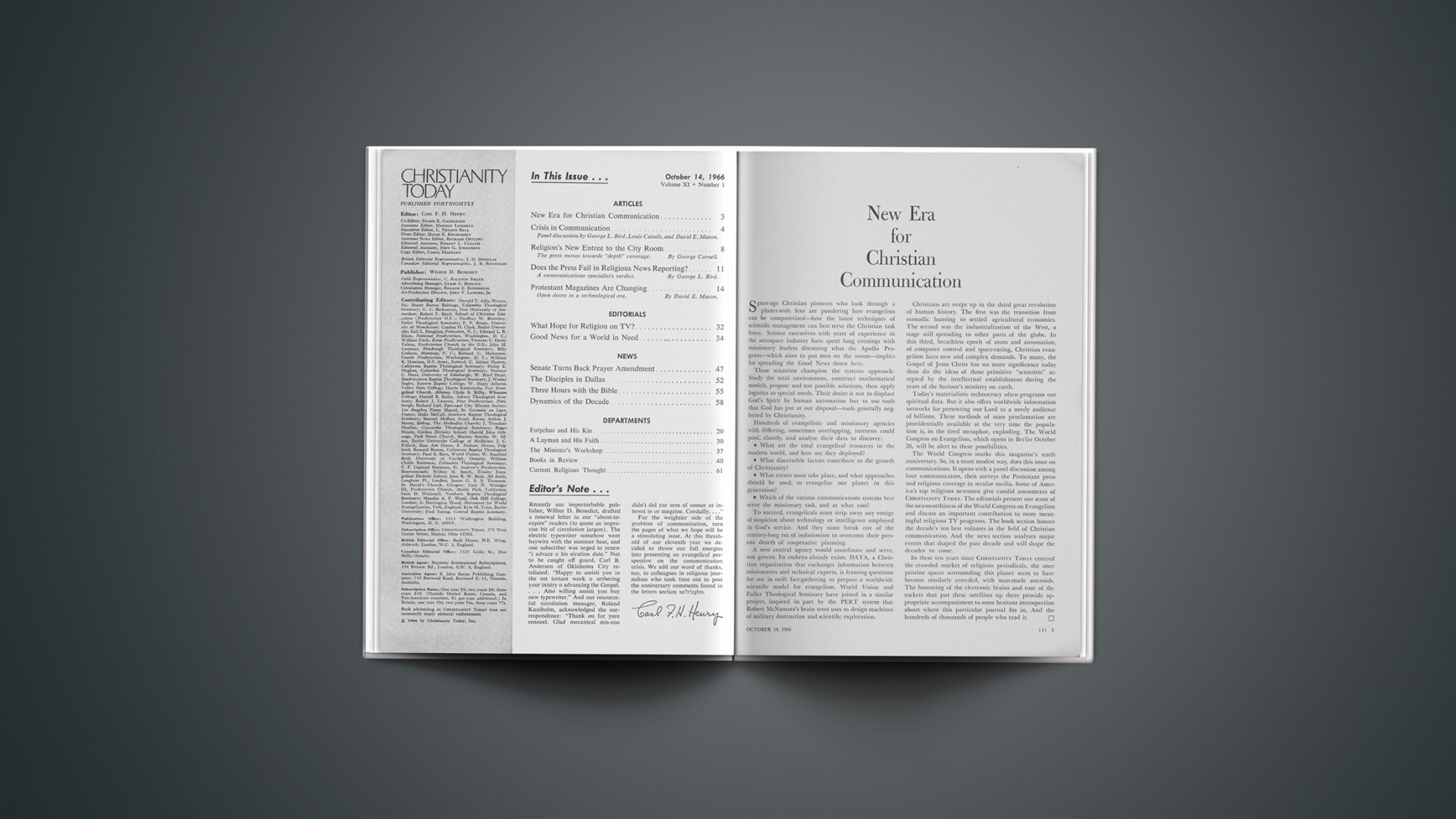Space-age Christian pioneers who look through a planet-wide lens are pondering how evangelism can be computerized—how the latest techniques of scientific management can best serve the Christian task force. Science executives with years of experience in the aerospace industry have spent long evenings with missionary leaders discussing what the Apollo Program—which aims to put men on the moon—implies for spreading the Good News down here.
These scientists champion the systems approach: Study the total environment, construct mathematical models, propose and test possible solutions, then apply logistics to special needs. Their desire is not to displace God’s Spirit by human automation but to use tools that God has put at our disposal—tools generally neglected by Christianity.
Hundreds of evangelistic and missionary agencies with differing, sometimes overlapping, interests could pool, classify, and analyze their data to discover:
• What are the total evangelical resources in the modern world, and how are they deployed?
• What discernible factors contribute to the growth of Christianity?
• What events must take place, and what approaches should be used, to evangelize our planet in this generation?
• Which of the various communications systems best serve the missionary task, and at what cost?
To succeed, evangelicals must strip away any vestige of suspicion about technology or intelligence employed in God’s service. And they must break out of the century-long rut of isolationism to overcome their present dearth of cooperative planning.
A new central agency would coordinate and serve, not govern. Its embryo already exists. DATA, a Christian organization that exchanges information between missionaries and technical experts, is framing questions for use in swift fact-gathering to prepare a worldwide scientific model for evangelism. World Vision and Fuller Theological Seminary have joined in a similar project, inspired in part by the PERT system that Robert McNamara’s brain trust uses to design machines of military destruction and scientific exploration.
Christians are swept up in the third great revolution of human history. The first was the transition from nomadic hunting to settled agricultural economies. The second was the industrialization of the West, a stage still spreading to other parts of the globe. In this third, breathless epoch of atom and automation, of computer control and space-racing, Christian evangelism faces new and complex demands. To many, the Gospel of Jesus Christ has no more significance today than do the ideas of those primitive “scientists” accepted by the intellectual establishment during the years of the Saviour’s ministry on earth.
Today’s materialistic technocracy often programs out spiritual data. But it also offers worldwide information networks for presenting our Lord to a needy audience of billions. These methods of mass proclamation are providentially available at the very time the population is, in the tired metaphor, exploding. The World Congress on Evangelism, which opens in Berlin October 26, will be alert to these possibilities.
The World Congress marks this magazine’s tenth anniversary. So, in a more modest way, does this issue on communications. It opens with a panel discussion among four communicators, then surveys the Protestant press and religious coverage in secular media. Some of America’s top religious newsmen give candid assessments of CHRISTIANITY TODAY. The editorials present our sense of the newsworthiness of the World Congress on Evangelism and discuss an important contribution to more meaningful religious TV programs. The book section honors the decade’s ten best volumes in the field of Christian communication. And the news section analyzes major events that shaped the past decade and will shape the decades to come.
In these ten years since CHRISTIANITY TODAY entered the crowded market of religious periodicals, the once pristine spaces surrounding this planet seem to have become similarly crowded, with man-made asteroids. The humming of the electronic brains and roar of the rockets that put these satellites up there provide appropriate accompaniment to some hesitant introspection about where this particular journal fits in. And the hundreds of thousands of people who read it.










